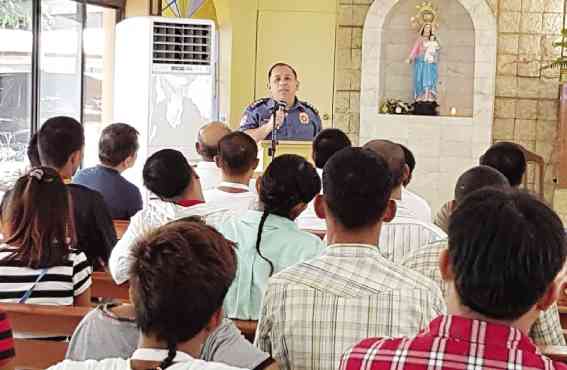Police lead druggies to treatment, reform

Senior Supt. Christopher Tambungan, Western Visayas assistant regional police director for operations, urges recovering drug addicts to work on their rehab. —NESTOR P. BURGOS
ILOILO CITY—Almost daily for a month, Randy (not his real name), a drug user and pusher, had been going in and out of the regional police headquarters in Camp Martin Delgado in this city.
He signs a logbook and is allowed to enter the camp after an identification mark is stamped on his wrist.
He proceeds to an air-conditioned chapel to join nearly 50 other drug users and pushers.
“I could not imagine going here weeks ago. I usually disappear when I see a policeman,” Randy said. “But now they are helping us.”
Randy is among 48 drug users and pushers who completed a 30-day treatment and rehabilitation program for drug dependents at the police camp.
Article continues after this advertisementInitiated by Chief Supt. Jose Gentiles, Western Visayas police director, the program is considered to be the first for drug users and pushers to be based in a police camp and implemented by the Philippine National Police.
Article continues after this advertisement“We have been arresting drug users and pushers but we also want to provide rehabilitation,” Gentiles said.
NGO help
The program is being implemented by the regional PNP in partnership with CDO Pathway to Recovery Foundation Inc., a Cagayan de Oro City-based nongovernment organization (NGO) helping alcoholics and drug addicts.
Supt. Gilbert Gorero, regional police spokesperson, said program participants were selected from the villages of General Hughes, Zamora, Monica Blumentritt, Muelle Loney, Santo Rosario-Duran, Concepcion-Montes and Veterans.
For a month, drug dependents and recovering addicts attend sessions from 5:30 p.m. to 9:30 p.m. daily except Sundays.
They go through psychotherapy sessions, lectures, religious activities and other exercises, said Alan Saab, executive director of CDO Pathway.
The five-member team of the foundation conducts the sessions. Members of the team include recovering addicts.
Participants each get a kilogram of rice and a can of sardines at the end of daily session.
“Most of them are unemployed or do not have a stable income,” Saab said.
“They are given rice and sardines so they can focus and don’t have to worry about the food they have to bring home,” he said.
Participants and their family members and village officials attended a graduation ceremony on Oct. 31 at the chapel after hearing Mass.
After the program, recovering addicts would be monitored for 90 days with the help of the PNP and barangay officials. Livelihood assistance is also in the works.
Saab said the crucial part of the program starts after it ends “because the possibility of relapse is constantly there.”
Of the initial 50 participants who were screened for the program, at least 10 dropped out or failed to continue but were replaced by those on the waiting list. Those who finished the course were found negative for drug abuse after two tests.
Drug users have welcomed the program as a crucial step in reforming.
“I want to stop because my addiction destroyed my life,” said Concepcion (not her real name), a 47-year-old mother of seven.
Tragic past
Concepcion became addicted to “shabu” (methamphetamine hydrochloride) after suffering from depression after her former husband raped their then 12-year-old daughter in 2000.
She used drugs two to three times weekly which she paid for from her income doing laundry.
Roel (not his real name), 54, joined the program hoping to earn back the respect of his community and to help ensure that he does not slide back.
“I stopped using drugs in February 2016 but people still see me as an addict,” he said.
A former seafarer, he lost his earnings and assets to addiction which started after a brother, a policeman, was killed in an operation.
In 2010, he suffered a cardiac arrest while in Dubai and was declared unfit for work. His wife left him with their two children.
“I had doubts in joining this because I don’t want to be identified especially by the police. But this has helped me and I became closer to God,” he said.
Participants admit that one of the reasons they joined the program is the fear of getting killed in the ongoing war on drugs.
Feeling safer
At least 16 suspected drug pushers have been killed in police operations since the crackdown on illegal drugs started on July 1, the first day at work of President Duterte.
This number is among the lowest in 18 regions in the country. Western Visayas is among three regions that had been identified by PNP chief, Director General Ronald dela Rosa, as lagging behind in antidrug campaign.
Program participants said they feel safer but also feel sad for those who died.
“There is still an option to help them and for them to seek help,” Randy said.
On Nov. 7, a second batch of 50 users and pushers will start another course at the police camp. Participants of the first batch will be among those helping the new ones.
“I used to try to convince friends and other people to try out and use drugs. Now, it’s different,” Randy said.